Be Alert: Vishing Scams May Target Your Bank Account

Be on the lookout for vishing scams! Vishing is a form of phishing in which scammers impersonate bank representatives over the phone. Their goal is to obtain personal and banking information – and they can be very convincing.
Here is how vishing scams work:
- You receive a call, often with the caller ID spoofed to look like your bank’s phone number.
- The scammer claims there is a problem with your account, like suspicious activity or a compromised debit/credit card.
- A sense of urgency is created, pressuring you to act quickly to “fix” the issue.
- They con you into revealing your account details, PIN, secure access code or social security number.
- The scammers may even trick you into transferring money to a “secure account.”
How to protect yourself from the scam:
- Remember that your bank will never ask you to share your secure access code or account passwords.
- If you are unsure of the call, hang up and contact your bank directly using a trusted phone number (found on your bank’s website or a statement, not the number from the caller ID or given by the caller).
- Don't be pressured into taking immediate action. A legitimate bank will understand your need to verify information before proceeding.
- Be wary of automated messages asking you to press buttons to “verify” your account information.
Four red flags of vishing scams:
- Sense of urgency: The scammers generate panic to cloud your better judgment.
- Unfamiliar phone numbers: Even if the caller ID seems legitimate, be extremely cautious, as phone numbers can be spoofed.
- Vague threats: Scammers often offer little detail concerning the supposed problem.
- Requests for confidential information: Banks won’t ask you for PINs or passwords.
Remember, your bank prioritizes your security. Texas Capital will never request sensitive information through unsolicited phone calls.
If you think you may be a victim of vishing, report it to your financial institution immediately.
For additional fraud prevention resources, please visit our e-fraud prevention portal at https://efraudprevention.net/us/texascapitalbank/portal.html.